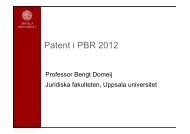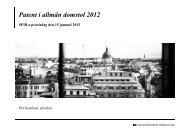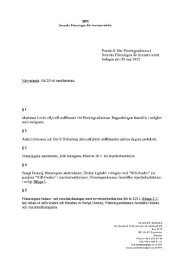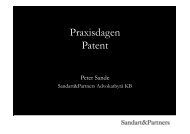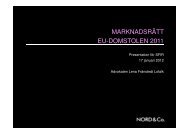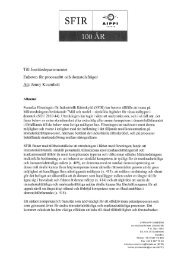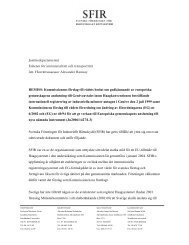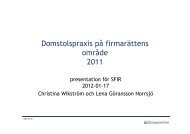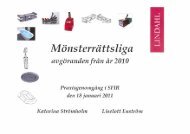Q178 draft report.pdf - SFIR
Q178 draft report.pdf - SFIR
Q178 draft report.pdf - SFIR
You also want an ePaper? Increase the reach of your titles
YUMPU automatically turns print PDFs into web optimized ePapers that Google loves.
3<br />
morality may not be patented under the EPC. However, ethical<br />
considerations do – and should – play a larger role outside the narrow<br />
field of patent issues. Nevertheless, many feel that it is wrong to allow<br />
for exclusive rights to biological material of human origin. For instance,<br />
the debate concerning patenting of human genes is ongoing in<br />
Sweden, involving political, legal and ethical experts, but consensus is<br />
not easily reached.<br />
The Swedish Group is of the opinion that there is a lack of knowledge<br />
and misunderstandings with the public on what exactly a patent right is.<br />
These misunderstandings could in the long run pose a threat to the<br />
existence of patent rights in biotechnology, as public perceptions<br />
influences the political decisions.<br />
The exceptions from patentability under the EPC are not clear. The<br />
case law of the Boards of Appeal at the European Patent Office (EPO)<br />
shows that the legal rules are difficult to implement in practice. This is<br />
evident concerning the exceptions for plant varieties and inventions<br />
contrary to ordre public and morality. The lack of clarity as to what<br />
should be patentable and not causes problems of interpretation. See<br />
supra question 2.3.<br />
2. Practice of the patent granting authorities<br />
2.1 What is the definition of patentable subject matter in your<br />
jurisdiction?<br />
European patent law is harmonized as to the granting of patents.<br />
Patent protection in Sweden is regulated in the Swedish Patents Act<br />
and the Patents Decree. Sweden, as a member of the EPC, has<br />
implemented the convention’s requirements on patentability in the<br />
Swedish legislation. Thus, the case law of the EPO Boards of Appeal<br />
serves as a standard for interpreting Swedish law. The EU Directive<br />
98/44 on the protection of biotechnological inventions (The Biotech<br />
Directive) aims to establish some clarifications in the field of<br />
biotechnology patents. The work of implementation of the Directive in<br />
Swedish legislation is currently taking place (September 2003).<br />
3



